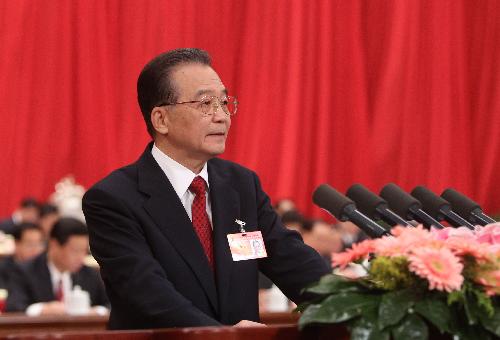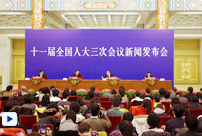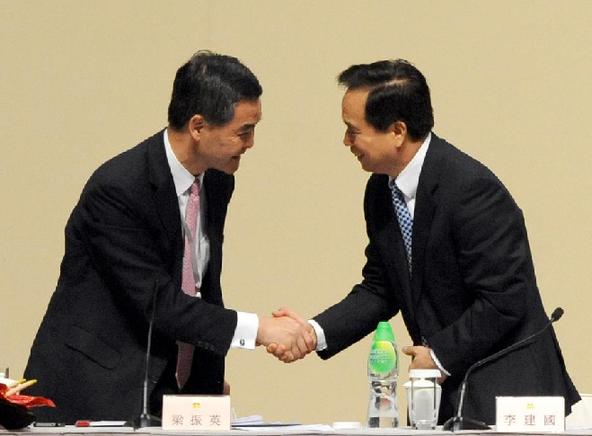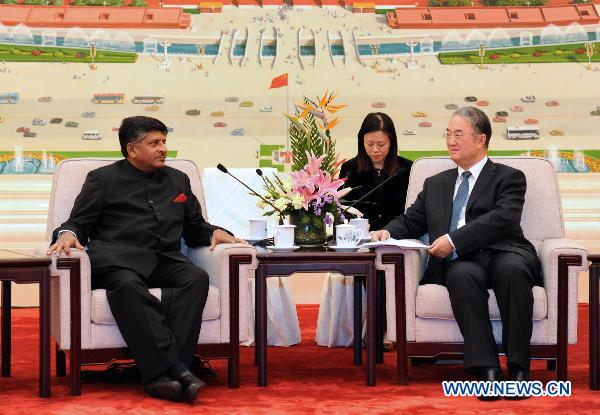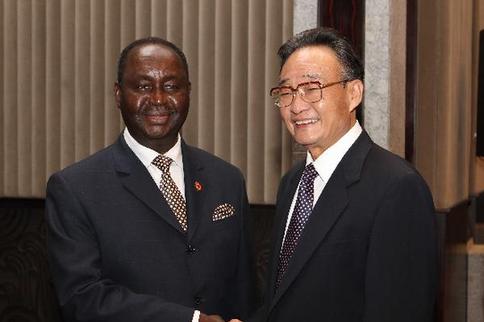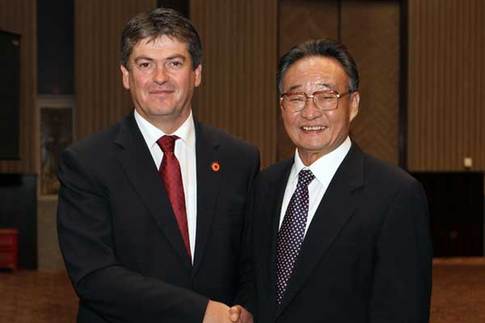All power in the People's Republic of China belongs to the people.The National People's Congress and the local people's congresses at various levels are the organs through which the people exercise the State power.All administrative, judicial and procuratorial organs in China are created by the people's congresses to which they are responsible and by which they are supervised.No organs of the State shall overstep the National People's Congress, and other Central State organs and the local State organs must observe the Constitution,1aWS and resolutions adopted by the National People's Congress.Specifically speaking, the relationship between the people's congresses and the administrative, judicial and procuratorial organs includes the following contents:
Administrative, Judicial and Procuratorial Organs, Created by and Responsible to the People's Congresses
The National People's Congress decides on the choice of the Premier of the State Council upon nomination by the President of the State and on the choice of other component members of the State Council upon nomination by the Premier;and elects the President of the Supreme People's Court and the Procurator-General of the Supreme People's Procuratorate.The Standing Committee of the National People's Congress may respectively appoint or remove.at the recommendation of the President of the Supreme People's Court and the Procurator-General of the Supreme People's Procuratorate, other relevant personnel of the above two organs;and decides, when the National People's Congress is not in session.on the choice of other component members of the State Council upon nomination by the Premier.
The local people's congresses at various levels respectively elect the principal and deputy leaders of the people's governments at the corresponding levels;and the local people's congresses at or above the county levels elect the president of the people's court and the chief procurator of the people's procuratorate at the corresponding levels.The standing committee of the local people's congresses at or above the county levels decides, upon nomination by the governor of the people's governments at the corresponding levels, on the appointment or removal of the secretary-general, the department and bureau directors, commission Chairmen and section chiefs of the people's governments at the corresponding levels, and appoints or removes relevant personnel of the people's court and the people's procuratorate according to 1aw;and decides, when the people's congress at the corresponding levels is not in session, on the appointment or removal of individual deputy governors of its people's governments and when, for any reason, the governor of it s people's governments, president of the people's court or the chief procurator of the people's procuratorate is unable to perform his or her duties, chooses a person from among the deputy heads of the people's government, people's court or people's procuratorate at the corresponding levels to act on his or her behalf.
The Central Government, the local people's governments, people's courts and people's procuratorates at various levels are created by the people's congress at various levels, to which they are responsible.The State Council is responsible to and reports its work to the National People's Congress;and when the National People's Congress is not in session, the State Council is responsible to and reports its work to the Standing Committee of the National People's Congress.The State Council is subject to making reports respectively on the implementation of the plans and budgets to the Standing Committee of the National People's Congress during the third quarter of each year.The local people's governments at various levels are responsible to and report their work to the people's congresses at the corresponding levels;and when the people's congresses at the corresponding levels are not in session, the local people's governments at or above the county levels are responsible to and report their work to the standing committee of the people's congresses at the corresponding levels.
The Supreme People's Court and the Supreme People's Procuratorate are responsible to and report their work to the National People's Congress and its Standing Committee;the local people's courts and people's procuratorates at various levels are responsible to the organs of the State power which create them, and to which they report their work.
Administrative, Judicial and Procuratorial Organs, Subject to the Supervision of the People's Congresses
In accordance with the provisions of the Constitution and laws, the National People's Congress shall supervise the State Council, the Supreme People's Court and the Supreme People's Procuratorate, which mainly includes the supervision over their work and legal supervision.
Firstly, it is the supervision over the work, which mainly includes listening to and deliberating on the reports on the work and other reports.And making proposals for addressing inquiries.
The National People's Congress and the local People's congresses at various levels have the power to examine and approve the plans for national economic and social development and budgets of the State or of their respective administrative areas and the reports on the implementation of such plans and budgets;the local People's congresses at various levels have the power, in accordance with the authorities prescribed by the law, to examine:and decide on plans for local development of the economy, cultural affairs and public services.The Standing Committee of the National People's Congress and of the local People's congresses at various levels have the power, when the people's congress at the corresponding level is not in session, to examine and approve partial alterations in the plans for national economic and social development and the budgets;and to supervise the work of the people's governments, people's courts and people's procuratorates at the corresponding levels, to keep in touch with the deputies to the people's congresses at the corresponding levels, and to accept and handle the complains and opinions of the masses for the above State organs and the functionaries of the State.
The National People's Congress and its Standing Committee often hear reports made by relevant departments on central tasks of the State, important events occurred and hot issues concerned by the masses.
Addressing inquiries to the State Council, the Supreme People's Court and People's Procuratorate is an important measure for the National People's Congress and its Standing Committee to conduct supervision over their work.Deputies to the National People's Congress and to the local people's congresses during the session of the people's congresses at the corresponding levels, and the component members of the Standing Committee of the National People's Congress and of the local people's congresses at or above the county levels during the meeting of the standing committees at the corresponding levels have the right, in accordance with the statutory procedure, to submit proposals for addressing inquiries to the people's governments and their working departments as well as to the people's courts and the people's procuratorates at the corresponding levels.The organs addressed must be responsible for replies.
Secondly, it is the legal supervision.The Standing Committee of the National People's Congress has the power to annul those administrative rules and regulations, decisions or orders of the State Council that contravene the Constitution or the law;the local people's congresses at various levels and the standing committee of the people's congresses at or above the county levels have the power to annul inappropriate decisions or orders of the people's governments at the corresponding levels;and the standing committee of the people's congress of the provinces, autonomous regions, municipalities directly under the Central Government and the capitals of the provinces as well as the comparative larger cities has the power to annul those inappropriate regulations formulated by the people's governments at the corresponding levels.
The Standing Committee of the National People's Congress conducts examination of and supervision over the implementation of laws as well, which has become a system and a major form of legal supervision.The Standing Committee of the National People's Congress conducts the examination of the implementation of several certain laws each year.The results of such examinations are reported at the meeting of the Standing Committee by groups of 1aw enforcement and examination.After deliberations on such reports at the meeting of the Standing Committee, the Standing Committee puts forth its opinions on rectification and reformation to relevant departments and demands them to give replies about the situation of their rectification and reformation to the Committee within six months.The practices in this respect have manifested that the law enforcement and examination have increased the dynamics of supervision conducted by the Standing Committee of the National People's Congress and have achieved better results.
No Interference in the Work of the Governments, People's Courts and People's Procuratorates Within the Scope of their Own Business by the People's Congresses
Administrative, judicial and procuratorial organs of the State are created by the people's congresses.to which they are responsible and by which they are supervised.However, it does not mean the people's congresses may, at random, interfere in the work of the above organs of the State within the scope of their own business.The administrative, judicial and procuratorial organs have their own respective work and tasks.The people's congresses shall not or cannot take everything on themselves. people's congresses are organs of the State power.Governments are the executive bodies of the organs of the State power.Therefore, they are the administrative organs of the State.The State Council has the power to adopt administrative measures, to enact the administrative rules and regulations, and to issue decisions or orders in accordance with the Constitution and the law;it has the power to formulate the tasks and responsibilities of the ministries and commissions under it, to exercise unified leadership over the work of the ministries and commissions, and to direct all other administrative work of national character that does not fall within the jurisdiction of the ministries and commissions;and it has the power to draw up and implement the plan for national economic and social development and the budget of the State.The local administrative organs of the State at various levels shall work under the unified leadership of the State Council.People's congresses may appoint or remove the component members of the governments and supervise their work, but not be allowed to interfere in the affairs within the scope of their own functions and powers at random.
In accordance with the provisions of the Constitution.the people's courts and the people's procuratorates shall independently exercise the judicial and procuratorial powers respectively in accordance with the provisions of the law.They are the judicial organs of the State and the State organs for legal supervision respectively.They exercise their functions and powers independently according to law and are not subject to interference by any administrative organs, public organizations or individuals.The Supreme People's Court and Supreme People's Procuratorate have the right to make interpretation of how to apply the law specifically in the judicial and procuratorial work. The Supreme People's Court supervises the judicial work of the local people's courts and special people's courts at various levels.The Supreme People's Procuratorate directs the work of the local people's procuratorates and special people's procuratorates at various levels.
